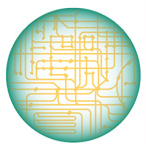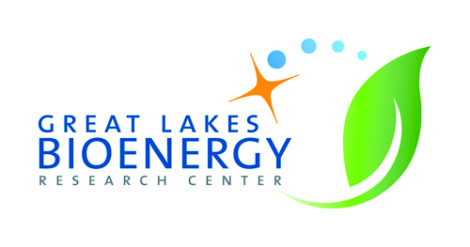 The Great Lakes Bioenergy Research Center (GLBRC) is a cross-disciplinary research center led by the University of Wisconsin (UW)–Madison. With Michigan State University (MSU) and other collaborators, GLBRC is developing biobased fuels and products that are economically viable and environmentally sustainable.
The Great Lakes Bioenergy Research Center (GLBRC) is a cross-disciplinary research center led by the University of Wisconsin (UW)–Madison. With Michigan State University (MSU) and other collaborators, GLBRC is developing biobased fuels and products that are economically viable and environmentally sustainable.
GLBRC scientists envision a future in which dedicated energy crops grown on nonagricultural land provide the raw materials for major portions of society’s liquid transportation fuels and chemicals that are currently derived from petroleum. This future will provide climate benefits without diverting land from food production and will create new economic opportunities for biorefineries, farmers, and rural communities that have been traditionally underserved by the current fuels and chemicals industry. To fulfill this vision, the center is addressing key knowledge gaps that currently limit the industrial-scale production of specialty biofuels and bioproducts from such purposegrown energy crops.
Research Focus Areas
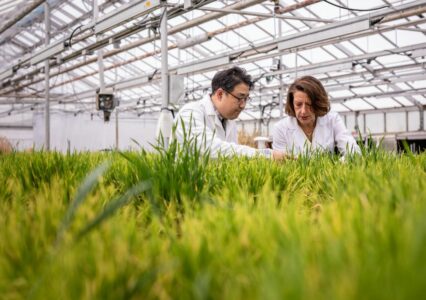
Bioenergy Crop Research. Federica Brandizzi (right), a Michigan State University (MSU) Foundation professor and GLBRC science director, and SangJin Kim, an MSU research assistant professor and GLBRC researcher, examine research crops. [Courtesy MSU]
Sustainable Bioenergy Cropping Systems. GLBRC is improving systems for growing dedicated energy crops on lands not currently used for agricultural purposes. This approach of using nonagricultural land for nonfood crops, such as poplar, switchgrass, energy sorghum, and mixed perennial species, reserves arable U.S. farmland for food production and simultaneously provides potential environmental benefits including climate change mitigation and increased biodiversity. The center’s goals are to generate a diversified portfolio of economically valuable bioenergy crops suitable for growth on bioenergy lands that also confer environmental benefits to enable sustainable conversion of crops to specialty biofuels and bioproducts. To achieve these goals, GLBRC research teams are:
- Engineering plants with modified lignin and highly digestible polysaccharides to improve biomass digestibility and conversion into specialty biofuels and bioproducts.
- Identifying and developing plant and microbiome traits that improve energy crop productivity and tolerance to environmental stress.
- Investigating micro- and landscape-scale controls on soil carbon sequestration, nitrous oxide emissions, and nitrogen fixation in energy cropping systems.
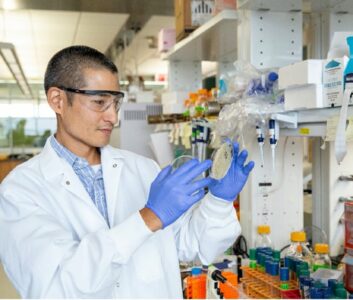
Improved Biomass Conversion. GLBRC researcher Trey Sato monitors yeast cultures in his lab at the University of Wisconsin–Madison. Sato and colleagues have engineered yeast to feast on a previously unpalatable sugar, potentially improving the microorganism’s ability to convert sugars to specialty biofuels. [Courtesy GLBRC]
- Identifying and overcoming metabolic burdens and lignocellulosic hydrolysate stresses that pose barriers to efficient production of the specialty biofuel isobutanol by industrially accepted microbes.
- Generating and implementing new designs for industry-ready platform microbes capable of producing optimal bioproducts and commodity chemicals from lignin and carbohydrate fractions not used for biofuel production.
- Generating and applying new high-throughput methods or approaches enabled by artificial intelligence and machine learning for protein, microbe, and plant biodesign.
Sustainable Field-to-Product Optimization. The path from farm field to bioproducts consists of several interdependent phases, including crop production, biomass deconstruction, and conversion into targeted bioproducts valuable to industry. GLBRC’s multidisciplinary research teams will define and mitigate the impacts of feedstock and landscape variability on biomass conversion to biofuels and bioproducts and model sustainable operations of integrated lignocellulosic biorefineries. To achieve these goals, GLBRC research teams are:
- Improving methods for feedstock-agnostic biomass deconstruction and separation by depolymerization and extraction of ligninderived aromatics before cellulose and hemicellulose deconstruction.
- Understanding how the performance of conversion microbes is affected by seasonal or environmental changes in energy crops and different deconstruction methods.
- Creating novel and robust plant, landscape, and biorefinery models to predict the sustainability, life cycle, and economic outcomes of optimal field-to-product pipelines.
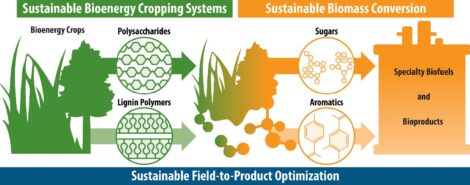
Research Integration. The Great Lakes Bioenergy Research Center is developing economically viable and environmentally sustainable biofuels and bioproducts. [Courtesy GLBRC]
Industry Partnerships
GLBRC works closely with companies and licensing agents to anticipate industrial needs, move new technologies into the marketplace, and advance the overall economics of biorefining. Industry collaborations help the center focus its research on critical industry bottlenecks and more quickly develop new technologies for commercial use. Industry representatives on GLBRC’s scientific advisory board provide valuable perspective and guidance on research directions.
GLBRC intellectual property (IP) is protected by and commercialized through the Wisconsin Alumni Research Foundation (a nonprofit entity that manages and licenses UW–Madison IP) and MSU Technologies, MSU’s technology transfer and commercialization office. These two organizations provide companies with opportunities to acquire rights to GLBRC inventions and copyrights to drive commercialization and create new economic opportunities for biorefineries, farmers, and rural communities.
Additionally, GLBRC works closely with a scientific advisory board comprised of leaders from industry, academia, and other groups engaged in BRC-relevant research. Board members provide objective strategic and technical advice on how to align GLBRC priorities with those of the BRC program and the evolving needs of the industry.
Education and Outreach
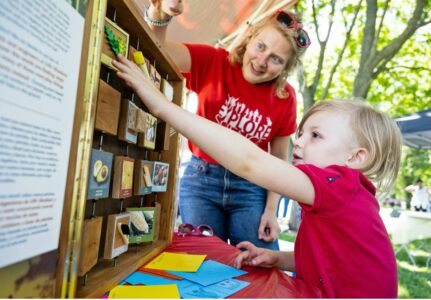
Community Outreach. Allison Bender, a GLBRC outreach coordinator, helps a child explore a memory game with tiles featuring information about petroleum- versus plant-based products at a Juneteenth celebration in Madison, Wis. [Courtesy UW–Madison]
GLBRC Partners
- University of Wisconsin—Madison (lead institution)
- Michigan State University (East Lansing)
- Michigan Technological University (Houghton)
- Princeton University (Princeton, New Jersey)
- Texas A&M University (College Station)
- University of British Columbia (Vancouver, Canada)
GLBRC Contacts
- https://www.glbrc.org
- Timothy Donohue, tdonohue@bact.wisc.edu
- UW-Madison Business Office
Wisconsin Energy Institute
1552 University Avenue
Madison, WI 53726
